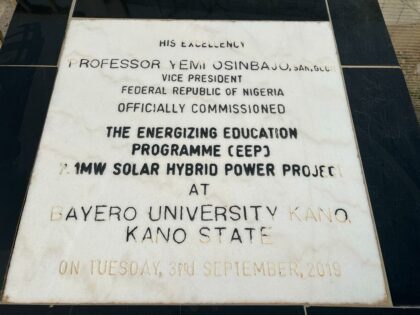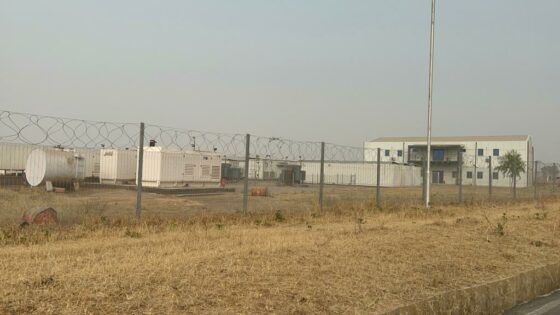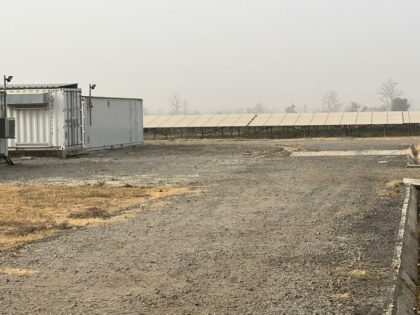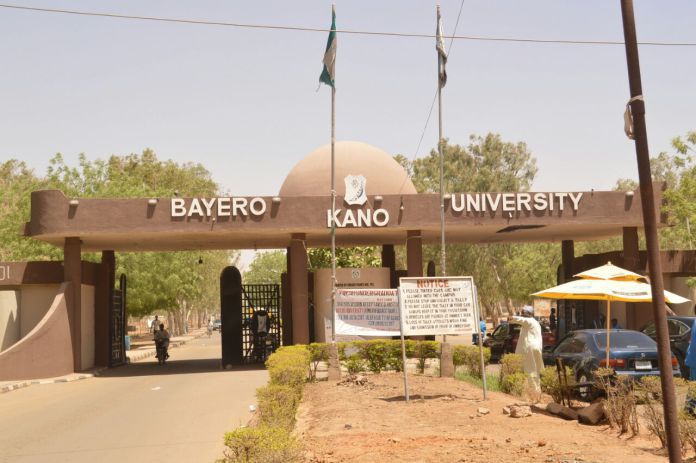INVESTIGATION: How multi-billion naira BUK solar plant is abandoned to rats as dept., faculties, hostels run on generators
In an effort to provide the nation’s ivory towers with uninterrupted electricity, in 2019 the Federal Government commissioned its solar hybrid power plant at Bayero University Kano (BUK), a multi-billion-naira investment awarded to a German company stopped working last year.
In this investigation, Elijah Akoji, uncovers how this left the institutions’ departments, faculties, hostels, and even major offices at the mercy of generators.
Students groan, lecturers fume, administrative staff frustrated, faculties while departments run on generators, and library now closes before the normal schedule hour as access to electricity becomes a scarce commodity for over 55,815 students and 3,077 staff of Bayero University Kano (BUK) despite over 2.8-billion-naira 7.1 megawatts hybrid solar power plant investment designed to provide electricity for the university community.
Bala Haruna, 25, not his original name, a student of Electrical Engineering could not describe his joy when the solar project was first commissioned, it came with so much hope for him, but his hope was cut short after he returned from the Covid break in 2021 and discovered that he will have to leave the library by 7 pm and read using street lights and also sleep in the hostel without light, this became his biggest nightmare as a student whose workload requires more reading hours so as to excel in his studies.
Forced by his predicament, Bala’s only option was to sell his laptop to raise some money and secure an off-campus apartment with his friend to ease the bill, where he can have access to a regular electricity supply and won’t have to read under the streetlight in the school as it has become the only way out for students.

“It is a total waste of resources to know that a multi-billion-naira 7.1 megawatts hybrid solar plant lay abandoned in the school, we thought after bidding farewell to the days of 6-10 pm generator hours in the school, we will never return to such lifestyle again, the situation has only worsened as even departments now run on generators,” Haruna laments.
Read Also: Investigation: How Rep member, agency abandoned communities, siphoned project funds in Benue State
“My worse frustration is not even having a convenient place to read, selling my laptop was the most difficult decision I have made but the best, I am about to graduate, imagine not having light to read as an electrical engineering student, it will be a big disaster for me and I am not ready for that,” he added.
In 2019, the Federal Government under its Energizing Education Program (EEP), a program implemented by the Rural Electrification Agency (REA), constructed a 7.1 megawatts hybrid solar plant, one of the biggest solar projects in Africa commissioned by Vice President Prof. Yemi Osibanjo, at Bayero University Kano (BUK), the Vice President reaffirmed the elimination of spending millions annually for the purchase of fuel and diesel to run the institution.
The solar plant which according to students only worked for 6 months after commissioning, has been abandoned to dust and rats while 3 years after, the school has returned to running on generator.
With the multi-billion-naira solar claimed investment, it is estimated that about 16.5 MW of existing generators and Carbon Dioxide emission would be conserved, thereby causing the quantum of megawatts capacity of petrol and diesel generators to be removed.
Sadly, Bayero University Kano still spends over 50 million naira annually on electricity supply to the school.
Sadiya Umar, not the original name, from the department of Sociology, laments to SOLACEBASE how the unavailability of light is forcing most students to always want to have their group studies outside the school.
“We are really suffering, now if we must study comfortably, we no longer consider the library, instead, we consider going to our friends outside the school. The light issue in the school has developed from worst to terrible, even our lecturers will tell us no light to prepare our lesson notes and that he can’t work at home, he is just paid to work in the office,” Umar said.
Read Also: Court strikes out Saraki’s suits against EFCC, ICPC, others
“As soon as the school turns off the hostel generator which they have reduced from 6 pm to 9 pm, we are forced to sleep in darkness, even light from KEDCO is no longer guaranteed. I must say it’s a critical time to be a student of BUK,” she added.
The Undeniable Reality.
A visit by SOLACEBASE to the Communication, Education, Social Science, and Engineering faculty, confirms his curiosity. While in the communication faculty, it was observed that the messenger was struggling to put the generator on for the faculty building.
At the department of Mass Communication and also Media and Information Studies, the sound of their working generator could be heard all over the faculty.
Faculty of Education, Engineering, and Social Sciences, share the same experience as most departments were seen running their generators, this is just to keep administrative tasks done, but for the classrooms and lecture theaters, students in their large numbers are forced to use hand fans to get some ventilation while lectures is ongoing.

A Staff from the faculty of communication who wants to remain anonymous narrates to SOLACEBASE that the poor supply of light is one major reason why so much work is left undone.
“Till this very moment, I don’t have a single idea why the school stopped using the solar plant, I only heard that it is completely shut down, but as to the cause, I don’t have a single idea about that.
“There are so many untreated files, every day I come to the office, it is either there is no light or by the time I will be in class they will beep the light and you can’t leave the lecture to go and attend to those tasks, I just hope this gets better soon as it is making work so difficult.”
In the school library, students are forced to read in the hot weather while at night the library generator only works from 6 pm-8 pm.
Students like Amos Danlami, who was seen fanning himself in the library explain that they are used to the condition.
“I am not longer bothered about the hotness, I just set my reading time, I focus to achieve it as planned, lamenting about the unavailability of light will only be a wasted effort, I doubt if the school is doing anything to resolve it, so I only read during the day,” Danlami said.
Financial Breakdown
While it was difficult for this reporter to obtain the record of what is spent monthly on fuel and diesel by each faculty and department monthly, this reporter then relied on the annual approved budget for electricity, fuel, and diesel in the institution.

Prior to the installation and commissioning of the solar plant in 2019, data obtained by this newspaper has shown that in 2018, a total of 26,965,338 million was approved for electricity consumption and 20,398,785 million was approved for fuel and diesel costs for generators.
In 2019, the same year the project was commissioned, a total of 26,965,338 million was approved for electricity while 20,398,785 was also approved budget for the purchase of diesel and fuel in the school.
Read Also:PHOTONEWS: President Buhari commissions $16m, 10MW Kano Solar Plant
In 2020, the COVID-19 year, 22,139,912 million was approved for electricity while 57,800,977 million was approved for diesel consumption, a double increase in the approved budget compared to the 2019 figure.

Interestingly, in 2021, the approved budget figure for fuel consumption increased to 80,398,785 million while for electricity the amount was maintained at 26,965,338 million. The electricity consumption for 2022 as approved still fall at 26,965,338 million, while the approved budget for fuel and electricity increased again to 80,398,785 million.
School Admit Solar Breakdown
Engineer Haruna Aliyu, the maintenance engineer in-charge of the solar project in an interview with this newspaper could not respond to all the questions but provided a few.
“The solar plant has been down for some time now, after it was constructed and supervised by the Rural Electrification Agency (REA) but was later handed over to the school and they hands-off completely.
“It is over a year now since the solar plant stopped working, while we are aware of it, we are also making effort to bring the engineers back to come and resolve the issue as one of the problems was from scratch as the company did not work with any local engineer who will understand the plant and help resolve issues when they arise, Aliyu said.
“It’s a German company which took monopoly of everything and has refused to come to help resolve the issues stating security as a major factor for their refusal, the school is doing its best to see that the plant works again and serves the university community effectively,” he added.
Engr. Dan Umma, Director Maintenance Services Department, Bayero University Kano when contacted via a telephone call declined to respond to questions, direct the journalist to first seek permission from the Vice Chancellor before he can respond to any question as regard the solar project.
Over 300 million Needed to Fix Problem – School Says
Lamara Garba, the Director Public Affairs of the institution while providing details of the present state of the solar plant attributed rainfall as the cause of the damage, noting that the school doesn’t have such amount of money to fix it.
“The solar plant served the school within the period it was fixed in 2019 and some part of 2020, it was after this period that the plant has been working until last year. We discovered that it is the converter that got damaged and will cost a fortune to repair.
“The company is giving several reasons why they can’t come to Africa for now, they were able to detect the issue from Germany and have been unable to come to fix it, from what we got from them, in conversion, it will cost over 300 million naira to fix the problem and you know the school can’t fix it, not with the volume of problem on the ground, when the company finally agrees to come over to resolve it, we will let everyone know, but for now, the school is on the matter to resolve the problem with the German company,” Garba said.



Comments are closed.